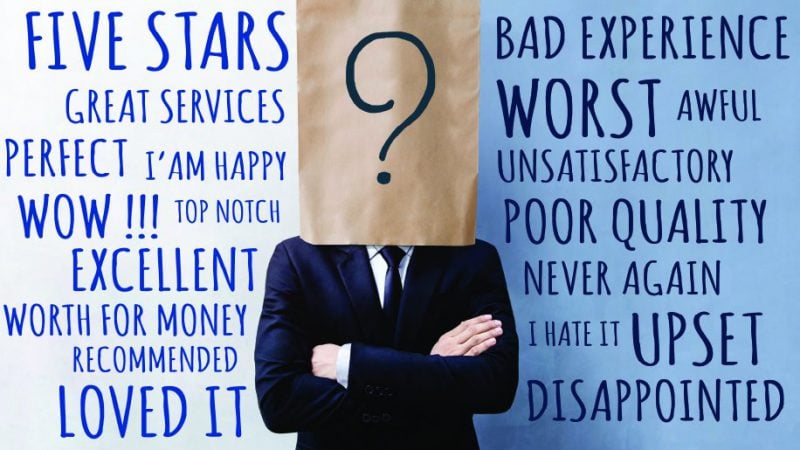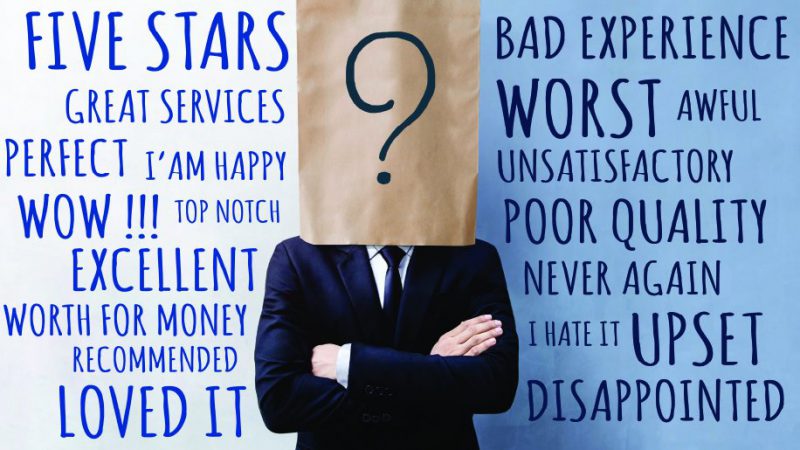The Reviews Are In
When it comes to buying travel, other people’s opinions count. But who can you trust?
March 30, 2019

User-generated feedback sites proliferate on the Internet with the promise of honest consumer comments and first-hand experience about the places we frequent as travelers. Hotels, restaurants and tour companies rely on people sharing their feedback and advice, which serves as another form of promotion or advertising. But as with many things online, it is hard to determine what and who to trust.
Like advertising, what we see and read can influence our decision making unconsciously and consciously, which is why when it comes to buying travel, review sites are not something that can be ignored. Still, exercising judgment when reading the commentary of strangers could go a long way in managing expectations when we travel.
Reviewing the Reviewer
Online sites like TripAdvisor and Yelp have revolutionized the way we analyze the quality of businesses. While we use these reviews to make travel decisions, it is important to realize that we don’t always know the user’s frame of reference.
Is what is important to you the same that’s important to another patron (think about families versus business travelers)? Is this the reviewer’s first time visiting that type of hotel? Or that destination? Do they normally dine out at similar establishments in the same area or price point, which would give them a framework within which they can judge? Is the service culture similar to what they are accustomed to or could there be misinterpretation?
The person who complains about bugs on a Caribbean guest room balcony may not realize that the problem is a function of the destination and not necessarily the property itself. In a way, we must “review” the reviewer before accepting their comments as fact. Since there is little information on the personal interests and experiences of each reviewer, it becomes difficult to weigh their opinions against what our own preferences, beliefs and expectations are about a place.
Traditionally, we have relied on trusted publications with seasoned journalists – think Business Traveler here – to put bias aside and report with objectivity and an understanding of the overall market. But with user-generated reviews, this scale of trust is shielded by anonymity and the possibility the findings may be colored either by lack of knowledge on a particular destination or by a different set of personal expectations. Therefore, taking the reviewer’s frame of reference into account becomes imperative.
A Grain of Salt
Yet there can still be tremendous value in online reviews.Worthwhile guidance on which specific hotel room numbers, room types or views to request, details on property renovations or changes to a menu, and photos that lack the editing brush can supply meaningful information that is otherwise absent from a business’ own website. It is an important part of the research process when planning travel. Nonetheless, it’s always good advice to take online reviews with a grain of salt. Since it is not clear what the standards are for the reviewer or their personal perspective, you, the reader, should search for specific details to help you draw your own definitive conclusion.
Focus less on matters of opinion, and instead search for details within each review that is rooted in fact. You can learn a lot from online reviews, such as which side of the hotel gets more sunshine or if there is construction currently taking place. Often, even greater detail comes in the business’ response to a review where information can be clarified or explained from a member of the management team.
Adjectives are subjective. For example, if one person claims that a hotel bed is comfortable, that experience may not be the same for another user. Some people like a firm mattress while others prefer a softer one. Claims like these are most noticeable when it comes to negative reviews, but remember that one user’s experience does not mean it will be the same for everyone.
“According to our research, more than 86 percent of consumers say reviews are an essential resource when making a purchasing decision,” says Theresa O’Neil, SVP of marketing for PowerReviews, which specializes in ratings, reviews, and question-and-answer technology to more than 1,000 global brands and retailers. “To protect against fake reviews, companies should have fraud detection triggers in place including IP address trackers, soliciting verified buyers, and moderating all reviews before they are posted. We typically flag less than 1 percent of reviews as fake, but brands and retailers must take the threat seriously to build and maintain trust with consumers.”
Good for Business
Adele Gutman, vice president sales, marketing and revenue for the Library Hotel Collection, highlights her own recent experience. “The impact of the TripAdvisor Travelers’ Choice awards in 2017 was immense. That year, one of our hotels, the Aria Hotel Budapest was recognized as having the highest guest satisfaction levels of any of the 1.1 million accommodations on TripAdvisor, which catapulted the hotel’s visibility in the travel world.”
Her company is no stranger to this type of monumental publicity. In 2010, her four New York City hotels (including Casablanca Hotel and Hotel Giraffe) were remarkably ranked as the top four hotels in the city leading to a large boost in visitor traffic and room night bookings. She notes that since then, TripAdvisor has changed the order in which hotels are displayed during a search.
Christophe Thomas, the general manager at the SLS Hotel, a Luxury Collection Hotel, Beverly Hills, says his hotel considers social review sites to be a very important piece of the guest experience. Each post gets reviewed and replied to publicly, as well as discussed and reviewed internally as a tool to better understand guest’s needs and expectations.
Hoteliers are keen to emphasize that if a guest has comments to share, they should always do so while they are in-house so it can be addressed in real time.
Many hotels have dedicated staff members whose role is to monitor online remarks and respond when necessary. A wide range of tools cater to companies to help them navigate the world of online reviews, including some to help promote positive reviews and suppress negative ones. Hotel and restaurant management professionals have learned a few strategies of their own. For example, a large percentage of online hotel reviews pertains to food and beverage. By creating separate pages for hotel restaurants, hoteliers can then redirect reviews pertaining to dining (through the help of TripAdvisor) to the restaurant’s own page.
This can help keep hotel rankings higher by separating the two subjects, which may appeal to two different types of traveler. Someone who is not interested solely in a hotel’s restaurant will not have to sift through those comments. Plus, relevant rankings will not be affected by someone’s perception of a restaurant (a common concern say some hoteliers).
Healthy Skepticism
The question remains, how are readers supposed to determine what they can trust online? Cornell University researchers developed a computer algorithm dubbed Review Skeptic meant to spot fake online reviews by comparing syntax used in legitimate reviews versus ones that are fake.
The program looks for extreme language with vague superlatives that give little details about the exact features of a place. Other targets include using complete brand names (like for the bedding or toiletry products), which could be a strategy some business owners adopt to appear higher in search engines.
According to researchers, the lack of details on spatial configurations of a reviewed location is another indication that the review could be fake. Generalizations and vague descriptions can be a solid giveaway.
Online review writers should consider their words carefully before taking to the keyboard because they can have a strong effect on business. To be fair, one lone poor experience should not a blistering review make; service-oriented products deserve a second chance before being labeled as poor for the world to see.
The consequences can be dire in some instances. For example, Uber drivers can lose their license without maintaining a 4.6 service score. Uber’s rule for drivers is intended for consumer protection, but a few crazy, off-handed or unfair reviews can hurt someone’s livelihood.
Businesses can contact online review sites for suspect reviews, which in turn leads to an investigation on the validity of the remarks. They can even request a receipt for proof. This is reassuring to travelers and businesses alike, who can take comfort in knowing that scammers cannot get away with manipulative reviews.
When all else fails, head for the middle. Discard the most glowing reviews and the harshest and study the ones that fall in between. That’s where the most value lies. And where truth may be found.




